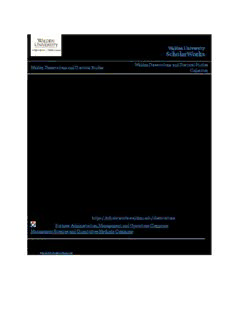
Scenario Planning for Organizational Adaptability PDF
Preview Scenario Planning for Organizational Adaptability
Walden University ScholarWorks Walden Dissertations and Doctoral Studies Walden Dissertations and Doctoral Studies Collection 2018 Scenario Planning for Organizational Adaptability: The Lived Experiences of Executives Robert John Gaskill-Clemons Walden University Follow this and additional works at:https://scholarworks.waldenu.edu/dissertations Part of theBusiness Administration, Management, and Operations Commons, and the Management Sciences and Quantitative Methods Commons This Dissertation is brought to you for free and open access by the Walden Dissertations and Doctoral Studies Collection at ScholarWorks. It has been accepted for inclusion in Walden Dissertations and Doctoral Studies by an authorized administrator of ScholarWorks. For more information, please [email protected]. Walden University College of Management and Technology This is to certify that the doctoral study by Robert Gaskill-Clemons has been found to be complete and satisfactory in all respects, and that any and all revisions required by the review committee have been made. Review Committee Dr. Thomas Schaefer, Committee Chairperson, Doctor of Business Administration Faculty Dr. Scott Burrus, Committee Member, Doctor of Business Administration Faculty Dr. Steve Roussas, University Reviewer, Doctor of Business Administration Faculty Chief Academic Officer Eric Riedel, Ph.D. Walden University 2018 Abstract Scenario Planning for Organizational Adaptability: The Lived Experiences of Executives by Robert John Gaskill-Clemons MBA, University of Maryland University College, 2010 MS, University of Maryland University College, 2009 BS, University of Maryland University College, 2008 Doctoral Study Submitted in Partial Fulfillment of the Requirements for the Degree of Doctor of Business Administration Walden University April 2018 Abstract Organizational adaptability is critical to organizational survival, and executive leadership’s inability to adapt to extreme disruptive complex events threatens survival. Scenario planning is one means of adapting to extreme disruptive complex events. In this qualitative interpretive phenomenological study, 20 executives who had lived experience with extreme disruptive complex events and applied scenario planning to help adapt participated in phenomenological interviews to share their experiences related to the application of scenario planning as a means adaptation to extreme disruptive complex events. Participants were from a single large organization with executives distributed throughout the United States and executives from 10 state agencies located within a single state. Using the thematic analysis process, 14 themes emerged. The themes included knowing the difference between adaptation and response, not being afraid to tackle difficult questions, scenario planning is never over because the environment constantly changes, the true measures of scenario planning value are the benefits achieved via the planning exercise versus the business application, and participation should be individuals who can or could have a direct influence on adaptation and do not get bogged down in structured and/or rigid processes, methods, or tools because while useful, they are not required to be successful. The implications for positive social change include the ability for organizations to reduce economic injury and the compound effects of disruption including the social impacts of business injury, disruption, recovery, job loss, and reduced revenue on communities and local economies. Scenario Planning for Organizational Adaptability: The Lived Experiences of Executives by Robert John Gaskill-Clemons MBA, University of Maryland University College, 2010 MS, University of Maryland University College, 2009 BS, University of Maryland University College, 2008 Doctoral Study Submitted in Partial Fulfillment of the Requirements for the Degree of Doctor of Business Administration Walden University April 2018 Dedication I never graduated high school because I had to drop out for reasons beyond my control, but eventually I got a GED. This study is dedicated to anyone else who never had the opportunity to finish high school but still grew up to be a doctor. Acknowledgments I would like to thank and acknowledge my doctoral committee (Dr. Thomas Schaefer, Dr. Scott Burrus, and Dr. Steve Roussas), my various course and residency professors, and everyone else who provided support and encouragement as I completed my doctoral program. Table of Contents List of Tables ..................................................................................................................... vi List of Figures ................................................................................................................... vii Section 1: Foundation of the Study ......................................................................................1 Background of the Problem ...........................................................................................1 Problem Statement .........................................................................................................2 Purpose Statement ..........................................................................................................3 Nature of the Study ........................................................................................................3 Research Question .........................................................................................................4 Interview Questions .......................................................................................................5 Conceptual Framework ..................................................................................................5 Operational Definitions ..................................................................................................6 Assumptions, Limitations, and Delimitations ................................................................8 Assumptions ............................................................................................................ 8 Limitations .............................................................................................................. 9 Delimitations ......................................................................................................... 10 Significance of the Study .............................................................................................11 Contribution to Business Practice ......................................................................... 11 Implications for Social Change ............................................................................. 12 A Review of the Professional and Academic Literature ..............................................13 Organization of the Literature Review ................................................................. 13 Literature Search Strategy..................................................................................... 14 i Content of the Literature ....................................................................................... 17 Integrated CAS Theory and Chaos Theory as the Conceptual Framework .......... 21 Relevant CAS Theory Concepts ........................................................................... 27 Relevant Chaos Theory Concepts ......................................................................... 30 CAS Theory and Chaos Theory Business Applications ....................................... 34 Scenario Planning Overview ................................................................................. 42 Metaphoric Scenario Planning Conceptual Examination ..................................... 43 Scenario Planning Benefits and Business Applications........................................ 46 Scenario Classifications and Validation ............................................................... 50 Scenario Development and Analysis .................................................................... 56 Scenario Planning Participants ............................................................................. 65 Scenario Planning Processes ................................................................................. 70 Scenario Planning and Strategy Toolkit Integration ............................................. 76 Scenario Planning Criticisms ................................................................................ 84 Integration of Scenario Planning, CAS Theory, and Chaos Theory ..................... 85 Transition and Summary ..............................................................................................88 Section 2: The Project ........................................................................................................91 Purpose Statement ........................................................................................................91 Role of the Researcher .................................................................................................92 Participants ...................................................................................................................95 Research Method and Design ......................................................................................98 Research Method .................................................................................................. 99 ii Research Design.................................................................................................. 100 Population and Sampling ...........................................................................................103 Ethical Research.........................................................................................................107 Data Collection ..........................................................................................................110 Instruments .......................................................................................................... 110 Data Collection Technique ................................................................................. 112 Data Organization Techniques ............................................................................ 114 Data Analysis Technique ...........................................................................................115 Data Analysis Process ......................................................................................... 117 Reliability and Validity ..............................................................................................124 Dependability ...................................................................................................... 124 Credibility ........................................................................................................... 125 Transferability ..................................................................................................... 127 Confirmability ..................................................................................................... 127 Transition and Summary ............................................................................................128 Section 3: Application to Professional Practice and Implications for Change ................129 Overview of Study .....................................................................................................129 Presentation of the Findings.......................................................................................130 Participant Profile ............................................................................................... 131 Emergent Themes ......................................................................................................137 Emergent Theme 1: There is a Difference Between Adaptability and Response ................................................................................................. 138 iii
Description: